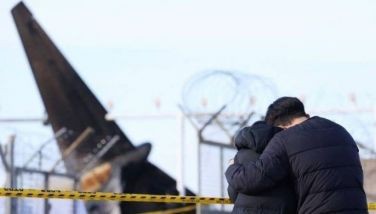NKorea aggression could strengthen US-China bond
April 6, 2013 | 11:21am
WASHINGTON (AP) — North Korea's latest outburst of nuclear and military threats has given the U.S. a rare opportunity to build bridges with China and revitalize the Obama administration's flagging policy pivot to Asia.
The architect of the administration's Asia policy described a subtle change in Chinese thinking as a result of Pyongyang's recent nuclear tests, rocket launches and abandonment of the armistice that ended the 1950-53 war with South Korea.
Pyongyang has taken similar actions in the past, prompting Washington to increase military readiness in the region to soothe allies South Korea and Japan. But in an unusual rebuke this week, Beijing called North Korea's moves "regrettable" — amounting to a slap from the country's strongest economic and diplomatic supporter.
"They, I think, recognize that the actions that North Korea has taken in recent months and years are in fact antithetical to their own national security interests," former Assistant Secretary of State Kurt Campbell told a panel Thursday at the Johns Hopkins School of Advanced International Studies.
"There is a subtle shift in Chinese foreign policy" toward North Korea, said Campbell, who retired in February as the administration's top diplomat in East Asia and the Pacific region. "I think that they have succeeded in undermining trust and confidence in Beijing."
State Department spokeswoman Victoria Nuland described "good unity" between the U.S. and China in responding to North Korea. "The issue here is to continue to recognize that the threats we share are common, and the approaches are more likely to be more effective if we can work well together," she told reporters Thursday.
President Barack Obama recently called China's new president, Xi Jinping, as part of an effort to brief the Chinese about U.S. plans to take steps to deter the threats coming from the North, The New York Times reported on its website Friday night.
For now, the crisis has given new importance to the White House's decision to bolster U.S. economic and security in the region that for years was sidelined as a priority by war and terrorism in the Middle East and North Africa.
Much of the policy has centered on China, both in strengthening diplomatic ties and economic trade. But China is an unreliable ally and has been suspicious about the U.S. move, which it sees as economic competition on its own turf.
North Korea's threats have focused China and the U.S. on a regional security threat instead of an economic rivalry.
"Part of the pivot is to also take a more active interest in the security issues in Asia," Sen. Ben Cardin, who chairs a committee overseeing East Asia, said in an interview this week. "And clearly, North Korea is the most difficult country and one that represents security issues for the countries in Asia, as well as indirectly affects U.S. interests."
North Korea has made an almost daily string of threats toward the U.S., South Korea and Japan and moved a missile with "considerable range" to its east coast, South Korea's defense minister said Thursday. But he emphasized that the missile was not capable of reaching the United States, and officials in Seoul and Washington agree there are no signs that Pyongyang is preparing for a full-scale conflict.
BrandSpace Articles
<
>
- Latest
- Trending
Trending
Latest
Trending
Latest
Recommended































